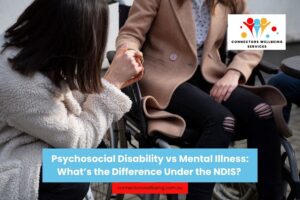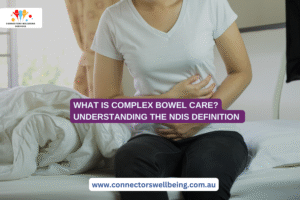It’s important to understand the difference between psychosocial disability and mental illness, especially when applying for support through the NDIS. While both are about mental health, they are not the same. Knowing how they are different helps people get the right support and avoid confusion during the process.
Mental illness is a health condition that affects how a person thinks, feels, or behaves. Psychosocial disability means the long-term problems a person has in everyday life because of their mental illness. This difference matters when the NDIS decides who can get help and what kind of support they need.
Mental illness can be defined as a list of conditions that are committed clinically, and which influence emotions, thoughts of an individual as well as behaviours. The most common ones are anxiety disorders, depression, PTSD, bipolar disorder, and schizophrenia.
Such conditions may be acute or long-lasting. Numerous individuals are in good shape and do not experience symptoms anymore after treatment and medication. Nonetheless, not everyone has short-term symptoms that bother them on a daily basis, interrupt their relationships, or work.
Mental illness may vary among people. Either he or she might have some occasional episodes, but the other one might have it all the time. It does not imply that being mentally ill makes one to be sick. The diagnosis only becomes a concern of the NDIS whereby the diagnosis triggers substantial and persisting functional limitations in areas of life that have been identified in the index.
Psychosocial disability is the undermining impacts of a severe, prolonged and serious mental health condition that has extensive functioning impacts. It concentrates on the social and practical constraints that the condition brings about and not on medical diagnosis.
Individuals with psychosocial disability may not be capable of managing other than self-care, social life, decision making, or participation in the lives of other members of society. Without a constant lack of support, these limitations may be difficult to get around in daily life.
To have the psychosocial disability accepted by the NDIS, there should be good reasons behind the disability that it was permanent and that it severely impairs the capacity of the person to perform without aid. This involves the requirement for additional support beyond normal mental support services, including therapy or medication.
As the conclusion of the process of assessment of mental illness, psychosocial disability is the impact of that diagnosis on the independent living and functioning in everyday life. Not all people with a mental illness have a psychosocial disability.
As an example, two individuals can be schizophrenic. It is possible to live decently in the case of medication and therapy. The rest can experience harsh interference with everyday activity, and need constant help, making them eligible for NDIS funding.
In the view of the NDIS the condition itself does not matter as much as its restriction to functionality within domains such as communication, mobility, and self-management. This is the determining factor as regards eligibility and access to the support services through the scheme.
NDIS finances individuals with psychosocial disability whose conditions have a high impact on the independent life of the individual. The scheme does not invest in clinical treatment- it funds assistance that enables the victims to cope with daily activity, social activity, or involvement.
These are such things as recovery coaching, support in person in a daily setting, capacity-building therapies, and help with accessing the community. The targeted outcome is enhanced independence and wellbeing in the longer term and will enable the participants to lead a more fulfilling life.
Individuals accepted into the psychosocial disability stream may request the assistance of the NDIS providers, local area coordinators, or support coordinators to assure that their support suits their recovery goals and personal needs.
To receive NDIS assistance on the basis of psychosocial disability, a patient should have a diagnosed mental issue which is likely to be chronic. The condition should have a significant impairment in daily functioning and involve the need of long-term active support that everyday mental health care cannot provide.
Applicants must supply professional evidence of how their condition impacts such areas as self- care, relationships, or coping with routines, which is typically provided by a psychiatrist, psychologist, or occupational therapist.
As an example, the daily support with medications, visiting appointments or emotional control issues can prove impairment on functions and establish the need of funded assistance.
Some types of mental health conditions that can potentially be covered by NDIS are schizophrenia, bipolar disorder, severe depression, PTSD, Schizoaffective disorder, and sometimes even borderline personality disorder. Nonetheless, it is not diagnosis only. The requirement is eligible according to the limitation of everyday functioning due to the condition.
Individuals holding a common diagnosis may require a wide range of support. This is why evidence (detailed and personalised) becomes significant during the application to demonstrate the way in which the condition impacts the independence of a person in managing themself.
Functional impairment refers to long-term difficulty performing daily tasks due to a mental health condition. The NDIS assesses this across six life areas: communication, social interaction, learning, mobility, self-care, and self-management.
If someone faces severe and ongoing challenges in one or more of these domains, they may be eligible for psychosocial disability support. The focus is on how the condition limits function, not just the diagnosis. Clear and practical examples of these impairments help build a strong NDIS application.
For those with approved NDIS plans, psychosocial support can include:
The victims of chronic mental illness also encounter certain obstacles that interfere with their independent living. Psychosocial disability support may be life-changing in such cases.
With NDIS, it is possible to address day-to-day needs, prevent hospitalisation, and enhance general wellbeing. Supports are not fixed and are modified to support the changing needs of the person over time so that he/she may continue to make progress in his/her recovery.
NDIS providers such as Connectors Wellbeing in Darwin provide one-to-one support to assist them be stable and achieve their goals of personal recovery. We move together with participants, families, and mental health specialists towards helping them receive loving, consistent care.
Contact us today to learn how we can help you apply for the NDIS and improve your quality of life in Darwin and nearby areas.







